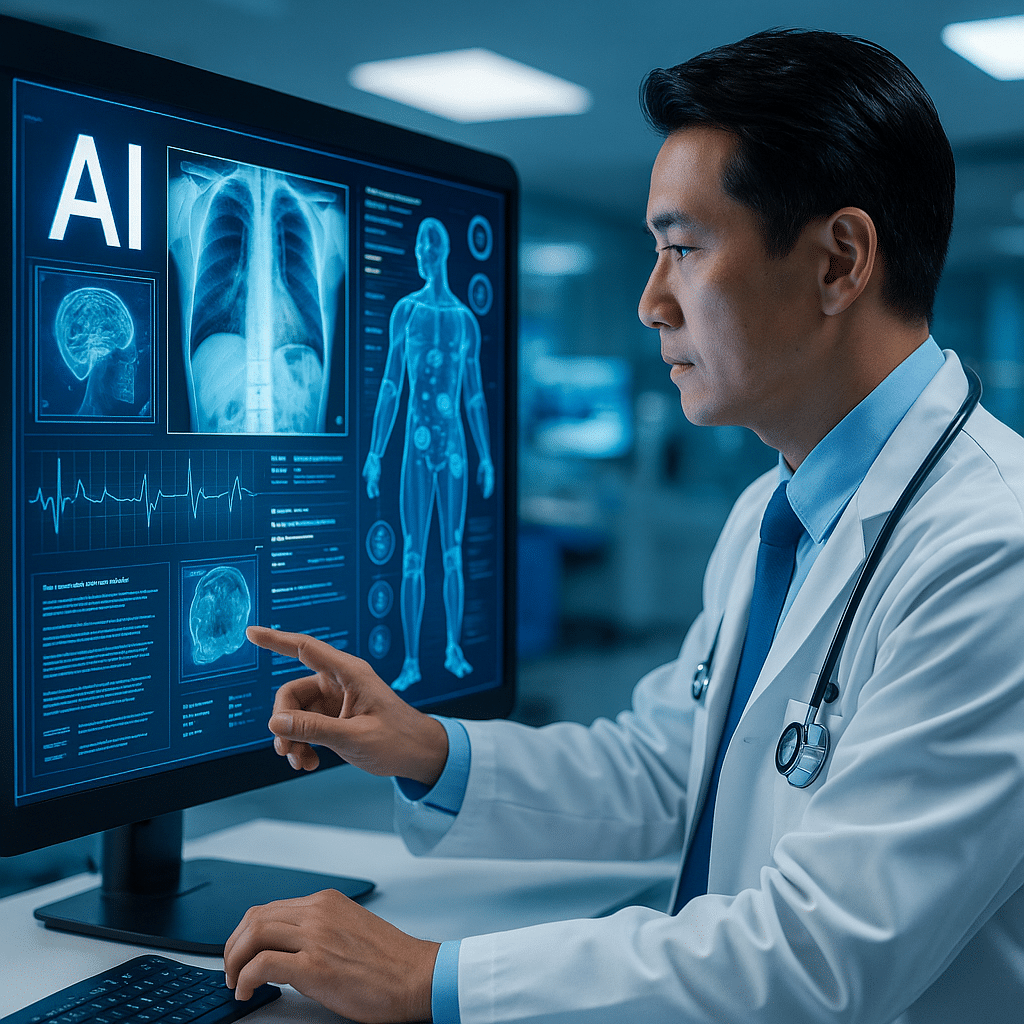AI in Healthcare: Artificial Intelligence Is Saving Lives
Introduction: AI in healthcare is not a futuristic concept—it’s happening now and saving lives. From advanced AI diagnostics that catch diseases earlier to intelligent healthcare technology streamlining patient care, AI in healthcare is proving its value in hospitals and clinics worldwide. In 2025, AI in healthcare has become an integral part of digital health innovation, offering powerful new solutions that improve patient outcomes and revolutionize care.
The Impact of AI in Healthcare
AI in healthcare is making a significant impact on global medicine, improving outcomes and saving lives across various medical fields. Despite healthcare being traditionally slow to adopt new technology, recent years have seen a surge in AI-driven solutions in medicine. In fact, artificial intelligence applications in healthcare are helping bridge gaps in access and quality. With around 4.5 billion people lacking essential healthcare services and an anticipated shortage of 11 million healthcare workers by 2030, AI has the potential to help fill this gap. By augmenting the capabilities of doctors and nurses, AI and medical AI tools can extend healthcare reach, standardize care quality, and provide support in under-resourced areas.
These advanced AI-driven systems analyze vast amounts of medical data to help doctors make faster, more accurate decisions. The result is earlier interventions and more efficient treatments that directly contribute to lives saved. For example, an AI algorithm might flag a critical abnormality in a patient’s scan or predict a potential health crisis before it escalates, enabling timely care when it matters most.
AI-Powered Diagnostics and Early Detection
One of the most prominent benefits of AI in healthcare comes from AI diagnostics – using algorithms and machine learning to detect diseases earlier and with greater accuracy than traditional methods. AI systems excel at analyzing medical images (like X-rays, MRIs, or CT scans) and can identify subtle patterns that even expert physicians might overlook. For example, an AI algorithm can review millions of radiology images to learn what malignant tumors look like and highlight suspicious areas for doctors. This capability is lifesaving, as early detection of cancers and other conditions can dramatically improve patient survival rates.
Medical AI programs are already outperforming humans in certain diagnostic tasks. For instance, a model analyzing data from 500,000 people predicted the onset of diseases like Alzheimer’s years before symptoms appeared. By catching conditions early, these technologies allow interventions that prevent diseases from progressing unchecked. AI in healthcare is also reducing errors in diagnostic processes. AI-powered software in endoscopy can identify polyps or early signs of colon cancer during a colonoscopy, helping doctors catch a deadly cancer much sooner. These examples show how AI diagnostics contribute directly to saving lives by improving accuracy and speed in identifying health issues.
Personalized Treatment and Patient Care
Beyond diagnostics, AI in healthcare is transforming how treatments are planned and how patients are cared for on an individual level. By analyzing large datasets of clinical and patient data, AI can help design personalized treatment plans tailored to each patient. This means patients receive therapies more likely to succeed for their specific condition (for example, in cancer care), leading to better outcomes and higher survival rates.
AI also plays a role in day-to-day patient care through smart monitoring. Intelligent healthcare technology like wearables and implants tracks patients’ vital signs in real time and alerts medical staff to worrying changes. This allows providers to catch complications early and respond before a situation becomes life-threatening. In chronic disease management, if an AI system detects a patient’s condition worsening, it can recommend prompt interventions or adjustments to treatment.
AI virtual assistants (chatbots) are also supporting patients by answering health questions and providing guidance 24/7. Patients rely on these tools to manage medications and symptoms at home. Some AI assistants can even predict health flare-ups in chronic disease patients and suggest preventive measures. By empowering patients and extending the reach of healthcare providers, such digital tools indirectly save lives through better-managed care.

Digital Health and Healthcare Technology Advances
The rise of digital health has gone hand-in-hand with advancements in AI in healthcare. Digital health encompasses telemedicine, mobile health apps, electronic health records, and other tech-driven healthcare services. AI enhances many of these platforms by adding smart, data-driven capabilities. For example, telemedicine platforms now integrate AI-powered symptom checkers or preliminary diagnostic tools that help remote patients get accurate advice. During virtual consultations, AI can assist doctors by analyzing patient data in the background, ensuring nothing critical is missed.
Healthcare technology powered by AI also includes administrative and operational tools that improve efficiency and patient safety. AI can automate routine tasks like scheduling, documentation, and even filling out medical reports in real-time during procedures. By taking over paperwork and repetitive tasks, AI systems free up doctors and nurses to spend more time on direct patient care. This leads to more attentive care and can indirectly save lives by reducing burnout and human errors.
Additionally, AI and digital health tools are beginning to address healthcare disparities. They make healthcare more accessible—AI chatbots provide basic medical advice to people in remote or underserved communities, and mobile health apps deliver personalized guidance to those who may not have immediate access to doctors. Experts note these AI innovations could help achieve universal health coverage by expanding reach and standardizing care. In short, the fusion of AI with digital health technology is creating a smarter, more connected healthcare system that benefits everyone.
Challenges and Future Outlook
While AI in healthcare offers many life-saving benefits, there are also challenges and considerations to address. One major concern is ensuring the accuracy and reliability of AI systems. If an AI makes a wrong diagnosis or recommendation, it could put patients at risk. Therefore, developers and healthcare providers are working on rigorous testing and validation for medical AI algorithms, and regulators have begun establishing standards for AI in healthcare. (In fact, as of 2024 nearly 900 AI or machine learning based medical devices had been authorized by the FDA, reflecting growing oversight alongside rapid innovation.)
Another challenge is integrating AI into clinical workflows and earning trust from medical professionals and patients. Doctors need training to effectively use AI tools and understand their limitations. Patients, on the other hand, may be wary of AI involvement in their care until they see the benefits firsthand. Privacy and data security are also critical issues, since AI often relies on large amounts of personal health data to learn. Ensuring that sensitive information is protected is paramount to maintaining patient trust.
Looking ahead, the future of AI in healthcare is promising as technology continues to advance. Ongoing improvements in AI and machine learning will make these systems even more capable of assisting in complex medical decisions. We can expect AI to play a role in drug discovery – finding new medications faster – and in preventive medicine by identifying risk factors earlier so doctors can intervene. With responsible development of medical AI to overcome current challenges and careful governance, AI will remain a powerful ally for doctors and patients alike, ultimately improving care and saving more lives.
FAQs on AI in Healthcare
Q: How is AI in healthcare saving lives today?
A: AI in healthcare saves lives by enabling faster, more accurate diagnosis and earlier detection of diseases. For instance, AI diagnostic tools can catch conditions like cancer or heart disease in early stages when they are more treatable. AI systems also monitor patients (such as through wearables) and alert medical staff to issues like irregular heart rhythms or dangerous vital signs in real time, allowing for quick intervention.
Q: What are some examples of medical AI in action?
A: One example is AI radiology software that scans X-rays or MRIs and finds abnormalities a human might miss. Another example is AI-driven predictive models in hospitals that forecast which patients are at risk of complications like sepsis so doctors can intervene early. AI chatbots also act as virtual health assistants, helping patients manage chronic diseases or answer health questions anytime.
Q: Can AI replace doctors in healthcare?
A: No. AI is designed to assist, not replace, doctors. AI algorithms excel at analyzing data and recognizing patterns, which complements a doctor’s expertise. By handling tasks like scanning medical images or analyzing lab results, AI frees up doctors to focus on patient care. Human judgment, empathy, and decision-making remain essential in healthcare, with AI serving as a support tool.
Q: How does AI improve healthcare technology and hospital operations?
A: AI improves healthcare operations by automating and optimizing processes. For example, AI can manage appointment scheduling and maintain medical records, reducing administrative workload. It can also predict patient admissions so hospitals allocate beds and staff efficiently. These improvements mean patients get care faster and with fewer errors, ultimately saving lives in critical situations.
Q: What are the risks or challenges of using AI in healthcare?
A: Challenges include ensuring AI’s accuracy (to avoid errors) and protecting patient data privacy. Doctors need proper training to use AI tools correctly. Despite these issues, experts are developing strict guidelines so that AI is used safely to improve care and save lives.
Conclusion
AI in healthcare has moved from theory to real-world practice, and it is already making a profound difference in patient outcomes. By combining the analytical power of machines with the expertise of medical professionals, artificial intelligence is helping to detect illnesses earlier, perform treatments with greater precision, and extend healthcare services to more people than ever before. The result is that lives are being saved—whether through an AI algorithm spotting a life-threatening condition in a scan, or a chatbot guiding a patient to seek care before an issue escalates.
In the coming years, as both AI technology and healthcare innovation continue to advance, we can expect the role of AI in healthcare to grow even further. Continued responsible development of medical AI will be key to overcoming challenges and ensuring AI remains a trusted ally for doctors and patients, ultimately improving care and saving lives.
Further Reading
- World Health Organization – Ethics and Governance of Artificial Intelligence for Health
Global guidance on how AI in healthcare should be developed and implemented responsibly.
👉 who.int/publications/i/item/9789240029200 - FDA – Artificial Intelligence and Machine Learning in Software as a Medical Device
Regulatory perspective on medical AI tools and their approval process.
👉 fda.gov/medical-devices/software-medical-device-samd/artificial-intelligence-and-machine-learning-samd - Harvard Business Review – How AI Is Changing Healthcare
Insights into the opportunities and challenges of AI-driven healthcare innovation.
👉 hbr.org/2020/10/how-ai-is-changing-health-care - NIH National Library of Medicine – Artificial Intelligence in Medicine: Applications, Implications, and Limitations
Peer-reviewed research on the use of AI across medical specialties.
👉 ncbi.nlm.nih.gov/pmc/articles/PMC6616181 - Mayo Clinic – AI and Digital Health Research
How AI is being used in patient care, diagnostics, and future healthcare research.
👉 mayoclinic.org/medical-professionals/artificial-intelligence-digital-health
